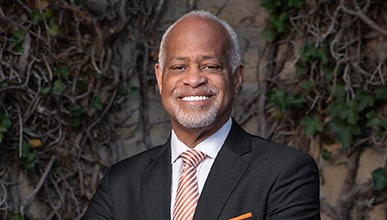Theater has always been a part of Dr. Harry J. Elam Jr.’s life. As a child, his mother kept a box of costumes for him to dress up in.
“I was fortunate too that she took me to the theater,” says Elam, who had served as vice provost for undergraduate education at Stanford University before being named president of Occidental College. “I just remember being amazed at acting and actors, and also, more than that, the power of theater to deal with complex, important social issues.”
 Dr. Harry J. Elam Jr.
Dr. Harry J. Elam Jr.In high school, Elam formed a theater group called “The Family” within the Black Youth Theater Group in Boston and continued to participate while in college at Harvard University.
By senior year, Elam intended on pursuing a law degree. However, he realized that the only aspect of law school that “excited” him was the “drama of the courtroom.”
Elam decided to attend the University of California at Berkeley where he eventually earned his doctorate degree in dramatic arts. There, he became interested in the research side of theater.
“When I got there, I found that love of research and theater, that love of writing critically about theater and performance,” says Elam. “And also coupled that with the idea of teaching. I really liked all of that.”
After graduating, he received a job as director of the committee of Black performing arts at Stanford. However, he arrived at a difficult time for both the university and the arts. At the time, the school was looking to cut a portion of its operating budget. One way to accomplish that was by eliminating the performing arts program. However, Elam pulled together students, alumni and faculty to save the department.
“I’ve seen the arts go from that sense of being almost an exercise to a space of much more prominence at Stanford,” says Elam. “And that sense of elevating the importance of the arts and creating better spaces for the arts at Stanford is something I’ve seen in my lifetime.”
During his 30 years at Stanford, Elam implemented a number of diversity initiatives. He created the Institute for Diversity in the Arts which trains and supports artists who bring diversity to their work in terms of both race and types of art.
He also worked toward increasing the number of students of color entering the science, technology, engineering and mathematics (STEM) fields. Elam created a program where students received mentorship and support towards research throughout their college career.
Additionally, Elam serves as one of the co-chairs of the diversity cabinet, which brings faculty and staff together to work on issues of diversity and inclusion on campus. While at Stanford, Elam says he was running a small liberal arts college within a larger university but was looking to expand on those experiences through a presidency role.
Elam was intrigued with Occidental’s focus on “reimagining, renewing, doing and rethinking liberal education in a place that is a distinctly urban setting.”
As part of his first goal as president of Occidental, Elam plans to work toward “thriving” in the new normal amid the coronavirus pandemic. Elam, who started his new role last month, will develop a more cohesive strategic plan and wants to build relationships within the city of Los Angeles.
Throughout his career, Elam has written seven books and his research has appeared in journals such as American Drama, Modern Drama, Theatre Journal and Text and Performance Quarterly.
Elam’s past experience as a theater director prepared him for his administrative roles and duties.
“That sense of working towards a collaborative vision, working collectively, trying to bring out people’s best work and ultimately in both academia and in the theater, the show needs to go on,” he says. “So, you’re working towards that.”
As an administrator, Elam says there’s never a dull moment and there’s always something to get “jazzed about.”
“I love working with students, even as my hair disappears. I feel younger,” he adds. “You get to reinvent yourself every September with the start of school and really interacting with them is one of the things that make what we do particularly special.”
This article originally appeared in the May 28, 2020 edition of Diverse. You can find it here.


















